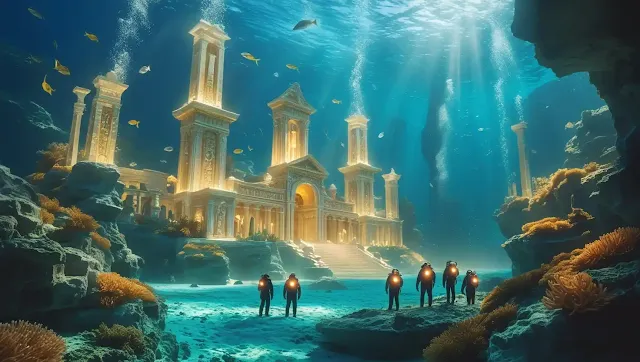The Lost City of Atlantis: Myth or Reality?
Daftar Isi
Hey there, history buffs and mystery lovers! If you’ve ever daydreamed about hidden cities, ancient civilizations, or epic tales of doom, you’ve probably heard of Atlantis. This legendary place is like the ultimate puzzle—described as a utopian society that sank beneath the waves thousands of years ago. But is it just a cool story, or could it actually have existed? Let’s dive in, explore where this idea came from, what the evidence (or lack of it) says, and why we’re still obsessed with it today. Trust me, this is gonna be a wild ride!
 |
| Illustration: The Lost City of Atlantis: Myth or Reality? |
The Origins of the Atlantis Legend
Plato’s Account: The First Mention of Atlantis
So, where did the Atlantis story even start? Blame it on Plato, the ancient Greek philosopher who dropped this bombshell around 360 BCE in his writings, Timaeus and Critias. He described Atlantis as this mega-powerful island nation way beyond the "Pillars of Hercules" (think modern-day Strait of Gibraltar). According to Plato, Atlantis was a naval powerhouse that ruled over parts of Europe and Africa, but then the gods got fed up with their arrogance, and bam!—in one day and night, the whole place got swallowed by the sea. Poof, gone forever.
Plato’s story is super detailed, talking about concentric rings of water and land, fancy architecture, and tons of resources. But here’s the catch: some folks think he made it up as a metaphor, like a warning about pride and greed, while others believe he was spilling real tea. It’s a debate that’s still raging!
The Search for Atlantis: Fact or Fiction?
Historical and Archaeological Perspectives
Okay, let’s get real: has anyone actually found Atlantis? Nope, not yet. No ruins, no artifacts, nada. Most experts say it’s just a myth, but that hasn’t stopped people from trying. Here are some of the coolest theories:
- The Minoan Connection: Some think Atlantis might be tied to the Minoans on Crete. They were a big deal around 2000 BCE, but their civilization took a hit when the Thera volcano (now Santorini) erupted around 1600 BCE. That disaster could’ve sparked stories of a lost city sinking into the sea.
- The Richat Structure: Ever heard of the Richat Structure in Mauritania? It’s this weird circular thing in the desert that looks kinda like Plato’s description. Some say it could be Atlantis, but there’s no proof—no buildings, no tools, nothing.
- Other Wild Guesses: People have thrown out spots like Antarctica, the Caribbean, and even the Andes Mountains. Sounds exciting, but so far, it’s all speculation without solid evidence.
So, yeah, no smoking gun yet, but the hunt keeps going!
Why Atlantis Endures: The Power of Myth
A Symbol of Human Curiosity and Imagination
Why are we still so into Atlantis after all these centuries? It’s simple: it’s the ultimate “what if” story. Atlantis is like our collective dream of a perfect society that messed up big time. It taps into our love for lost treasures, ancient wisdom, and the idea that there’s more out there than we know.
Plus, it’s everywhere in pop culture! Books like Jules Verne’s 20,000 Leagues Under the Sea, movies like Disney’s Atlantis: The Lost Empire, and even video games have kept the legend alive. It’s not just history—it’s a cultural phenomenon.
The Scientific Perspective: Separating Fact from Fiction
Why Atlantis Remains Elusive
Scientists aren’t as romantic about this. They say the odds of Atlantis being real are slim to none. Plato’s the only ancient source we’ve got, and no fossils, maps, or underwater cities back him up. Geologically and archaeologically, there’s no record of a huge civilization vanishing overnight like that.
But here’s the silver lining: chasing Atlantis has taught us a ton about ancient cultures and natural disasters. It’s like a treasure hunt that, even if you don’t find the gold, you still learn something cool along the way.
The Legacy of Atlantis
What Atlantis Means Today
Whether it’s real or not, Atlantis is a big deal. It’s a story that makes us wonder, dream, and question. It’s about humanity’s drive to explore, our fear of failure, and our hope for rediscovery. Even if we never find the actual city, the idea of Atlantis keeps inspiring us to look deeper into history and ourselves.
FAQs About Atlantis
Got questions? Here are some quick answers:
- Was Atlantis a real place? Probably not. Most scholars think it’s a myth Plato cooked up, but the debate’s still hot.
- Where is Atlantis supposedly located? Theories range from the Mediterranean to Antarctica, but no one knows for sure.
- Why is Atlantis so popular? It’s the ultimate mystery—a lost utopia that mixes history, adventure, and imagination.
- Could Atlantis have been inspired by a real event? Maybe! The Thera eruption or the fall of the Minoans could’ve been the spark for Plato’s story.
- Will we ever find Atlantis? Doubtful, but the search keeps uncovering cool stuff about our past.
Conclusion
Atlantis might be a myth, but man, what a myth! It’s a tale that hooks us with its mystery, challenges us with its questions, and reminds us how much we love a good story. Whether it’s buried under the ocean or just in our imaginations, Atlantis will keep us guessing and dreaming for years to come. So, grab a map, fire up your inner explorer, and let’s keep the legend alive!
Wanna dig deeper? Check out these gems:
- 1. “Atlantis: The Truth Behind the Legend” by Stavros Papamarinopoulos
- 2. “The Atlantis Story: A Short History of Plato’s Myth” by Pierre Vidal-Naquet
- 3. “Lost Continents: The Atlantis Theme in History, Science, and Literature” by L. Sprague de Camp
You can find these at your local bookstore or online—they’re packed with juicy details and smart takes!